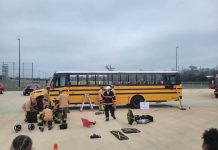While Bullying Awareness Month brought this issue to the center stage in October, many school and transportation administrators may not know that bullying is a civil rights issue for students with special needs. The U.S. Education Department’s Office for Civil Rights (OCR) recently issued guidance to schools outlining ways to prevent bullying and protect students, including the nation’s 6.5 million students who have disabilities.
Since 2009, OCR said it has received more than 2,000 complaints about students with disabilities being bullied in public elementary and secondary schools. If a student with special needs is being bullied, federal law requires schools to take immediate and appropriate action to investigate the incident, take action to stop the bullying and prevent any recurrence.
Bullying among students often occurs off campus, at bus stops and during the bus ride to and from school, according to news reports. Recent cases in Ohio, Washington and South Carolina reveal that special needs students are also vulnerable to sexual assault and coercion by peers. Two of these three incidents occurred on the school bus.
The OCR guidance that specifically discusses school buses is located under “C. No Disability-Based Harassment Violation, No FAPE Violation” on pages 11 and 12, and uses the school district as an example of “appropriate response.”
“While there is broad consensus that bullying cannot be tolerated, the sad reality is that bullying persists in our schools today, especially for students with disabilities,” said Catherine E. Lhamon, assistant secretary for civil rights. “Basic decency and respect demand that our schools ensure that all their students learn in a safe environment. I look forward to continuing our work with schools to address and reduce incidents of bullying so that no student is limited in his or her ability to participate in and benefit from all that our educational programs have to offer.”
The new guidance clarifies that the protections for students with disabilities who are bullied on any basis extend to the estimated three quarters of a million students who are not eligible for IDEA services but are entitled to services under the broader Section 504 of the Rehabilitation Act of 1973. That law bars discrimination on the basis of disability in all programs or activities that receive federal financial assistance.
Assistance is available for those who are targets of bullying as well as those who suspect someone is a victim. The OCR recommends addressing any reported bullying of a student with special needs as follows:
- Request to meet with the student’s team that designs his or her individualized education program: the IEP or Section 504 teams;
- Ask to meet with the principal or school district’s special education coordinators to have the school address bullying concerns; and
- Seek help from the OCR, which investigates complaints of disability discrimination at schools, and fill out a complaint form online.
In addition, www.stopbullying.gov provides information for schools on bullying prevention and remedies.


















